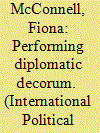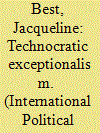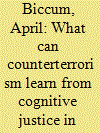|
|
|
Sort Order |
|
|
|
Items / Page
|
|
|
|
|
|
|
| Srl | Item |
| 1 |
ID:
163724


|
|
|
|
|
| Summary/Abstract |
Using the theoretical toolkit of material-semiotics, this article theorizes global migration governance as a governing technology that constitutes migration as an object of global governance. Methodologically, the analysis draws on event observation of the International Organization for Migration's International Dialogue on Migration. Empirically, the article uses the illustrative example of the International Organization for Migration's Migration Governance Index to make the case for a material-semiotic account of global migration governance more concrete. Overall, the article seeks to examine and enhance the contribution that practice-theoretical approaches make to the analysis of global governance.
|
|
|
|
|
|
|
|
|
|
|
|
|
|
|
|
| 2 |
ID:
163715


|
|
|
|
|
| Summary/Abstract |
This paper interrogates the notion of diplomatic decorum in order to shine new light on the power relations that underpin performance, rhetoric, and emotional labor in international politics. In framing decorum in terms of Aristotelian rhetoric and dramaturgical principles, the paper focuses on representatives of minority communities, indigenous peoples, and stateless nations for whom adopting social behavior appropriate for the spaces of international diplomacy takes on a heightened importance. Drawing on postcolonial critiques of diplomacy, attention turns to two distinct political repertoires and configurations of style and subject that these liminal geopolitical actors engage with. First the paper examines the extent to which “unofficial” diplomats perform behavior fitting to a particular diplomatic space and how they seek to enact a diplomatic style that will be deemed appropriate to their subject position as both outsiders and aspirant diplomats. Second, the paper examines what it means to break the unwritten rules of diplomatic decorum, both in terms of incidences where individuals push the boundaries deliberately in order to perform otherness, and in examples where diplomatic performances go awry. The paper concludes by considering the ways in which decorum is a productive lens through which to view and reassess the colonial norms and power relations underpinning diplomacy.
|
|
|
|
|
|
|
|
|
|
|
|
|
|
|
|
| 3 |
ID:
163720


|
|
|
|
|
| Summary/Abstract |
In explaining political violence, Conflict and Security Studies commonly focuses on the rational decision-making of elites. In contrast, this article considers the everyday aspirations of rebel grassroots. Understanding their lifeworlds is important, as their interaction with rebel elites shapes the collective trajectories of revolutionary movements and, thus, wider dynamics of war and peace. This article analyzes the social practice of revolutionary karaoke music in Myanmar's Kachin rebellion as a window into these hidden social dynamics of political violence. It does so by merging a relational reading of rebel figurations with a visual ethnographic methodology that moves beyond the textual study of propaganda lyrics. Instead, it analyzes the audio-visual aesthetics and social practices of revolutionary karaoke. This critical mode of inquiry reveals the emotional dimension of rebellion, that is, its appeal to affect rather than reason. It also suggests that revolutionary cultural artifacts can be more than just instrumental propaganda vehicles for instilling elite ideologies into un-agential masses. Indeed, the article shows that many young Kachin are not just passive consumers of propaganda. In karaoke bars and music studios, they actively perform rebellion. In so doing, they coproduce their own rebel subjectivities and rebel political culture at large.
|
|
|
|
|
|
|
|
|
|
|
|
|
|
|
|
| 4 |
ID:
163709


|
|
|
|
|
| Summary/Abstract |
What do border guards and central bankers have in common? Both operate, on a day-to-day basis, in political spaces exempt from many of the norms of liberal democratic politics and yet have the power to define and constrain them. In order to understand the role of such routine suspensions in the norms of liberal politics, we need to move beyond analyses that focus narrowly on security exceptionalism or emergency-management and pay attention to the practices of technocratic exceptionalism. Drawing on Foucault's lectures on biopolitics, I examine the ways in which economic theory and practice has sought to resolve some of the central tensions in liberalism by protecting the market from too much democracy—a kind of exceptionalism exemplified by the doctrine of central bank independence.
|
|
|
|
|
|
|
|
|
|
|
|
|
|
|
|
| 5 |
ID:
163712


|
|
|
|
|
| Summary/Abstract |
Veterans have long sought to make sense of and capture their wartime experiences through a variety of aesthetic means such as novels, memoirs, films, poetry, and art. Increasingly, scholars of international relations (IR) are turning to these sources as a means to study war experience. In this article, we analyze one such sense-making practice that has, despite its long association with war, largely gone unnoticed: the military tattoo. We argue that military tattoos and the experiences they capture can offer a novel entry point into understanding how wars are made sense of and captured on the body. Focusing on a web archive—War Ink—curated and collected for, and by, US veterans of Iraq and Afghanistan, we analyze how tattoos perform an important “sense-making” function for participating veterans. We focus on three recurring themes—loss and grief, guilt and anger, and transformation and hope—and demonstrate how military tattoos offer important insights into how military and wartime experience is traced and narrated on and through the body. The web archive, however, not only enables a space for veterans to make sense of their war experience through their tattoos, it also does important political work in curating the broader meaning of war to the wider public.
|
|
|
|
|
|
|
|
|
|
|
|
|
|
|
|
| 6 |
ID:
163718


|
|
|
|
|
| Summary/Abstract |
Global citizenship education (GCE) has been elevated by the UN to form both part of its Sustainable Development Goals for education and the central tenet in its Preventing Violent Extremism through Education (PVE-E) strategy. I argue that GCE has no chance of playing a role in counterterrorism unless it embraces a decolonial approach to cognitive justice. The paper provides a descriptive account of the politics of GCE and its take-up by the UN and UNESCO, including an account of postcolonial and decolonial approaches to GCE. The paper conducts an interpretive discourse analysis of textual data around UNESCO's approach to GCE and PVE-E to assess how, if at all, history and historical literacy is addressed. Through this analysis, combined with interview data, previous ethnographic experience, and secondary literature in the field of terrorism studies and political violence, the paper concludes by making a case for the inclusion of historical literacy in education designed to promote peace, justice, and global citizenship. The paper makes no naïve claims about GCE as a panacea for political violence; rather it suggests that if there is any hope of it performing the function that UNESCO ascribes to it, it will only be through the inclusion of cognitive justice.
|
|
|
|
|
|
|
|
|
|
|
|
|
|
|
|
|
|
|
|
|